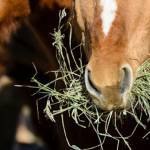Eating Well But Losing Weight: Is This Horse All Right?

A horse’s body weight normally fluctuates a little bit due to season, age, health status, parasite load, dental condition, amount of concentrate consumed, access to pasture, level of exercise, and other factors. If a horse backs off his feed for some reason, he can be expected to lose some weight over a period of time. However, if the horse has a good appetite and seems to eat normally but is losing significant amounts of weight, owners and veterinarians have reason to suspect a serious problem. It’s important to look for a cause of weight loss and find a way to reverse the trend before the horse reaches a point at which a large percentage of body mass has disappeared.
An owner may say, “But my horse eats all the time! How can he be losing weight?” In some cases, the problem might be related more to quality than to quantity of forage and feed. Horses turned out on poor pasture might seem to be eating constantly, but their actual intake could be lower than their requirement because the field has been overgrazed. Feeding poor-quality hay will give the same result, as horses get little nourishment out of tough, stemmy plants. Changing to high-quality hay that is free of weeds, debris, and overmature plants will probably make a significant difference. It may be necessary to add a vitamin-mineral supplement or some concentrate meals to help these horses regain body condition. Owners who are not sure of the best way to meet nutritional requirements for their horses should consult an equine nutritionist for a dietary evaluation.
Changes in management and feed quality might take care of weight loss problems in some horses. In other animals, weight loss may persist despite the best feed and careful attention to health management. Some type of disease may be the next thing to look for.
Researchers at the School of Veterinary Medicine at University College in Dublin, Ireland, investigated the records of 40 horses that were examined because they were losing weight despite having a good appetite. Scores for body condition and blood levels of total protein and albumin at the time of admission to the clinic were compared with outcome (survival versus death).
Horses with greater levels of plasma total protein and especially albumin were more likely to survive, as were horses with higher body condition scores. Albumin is a protein that makes up about half the protein content in the blood. It is synthesized by the liver and is important in body functions such as the transporting of hormones, fatty acids, and other compounds. A low albumin level can be a sign of liver disease, kidney problems, or bowel malfunction, any of which could cause weight loss and eventual death.
A number of factors may contribute to the loss of condition in a horse that eats well. Owners should schedule a veterinary examination for horses that cannot maintain body weight. The researchers in this study suggested that body condition score and albumin concentration could potentially be used in determining the prognosis for a horse that is eating but losing weight.








